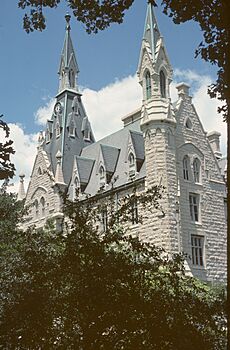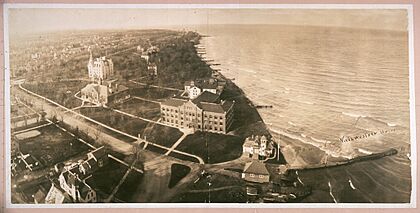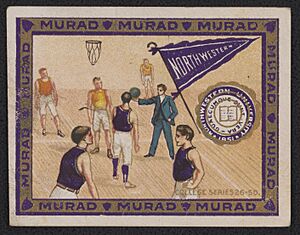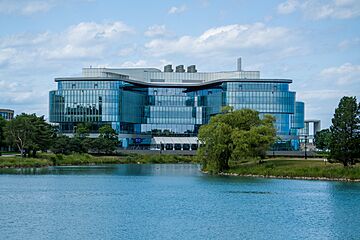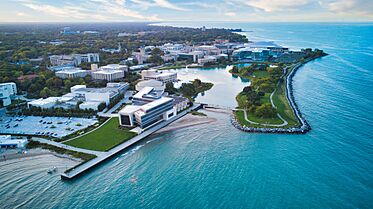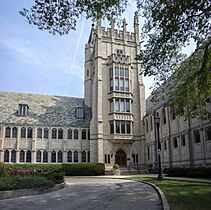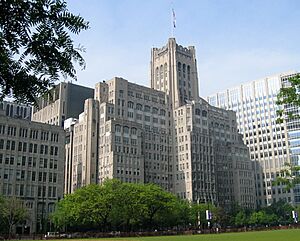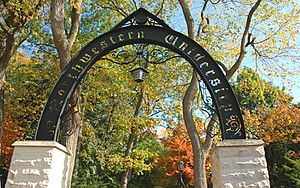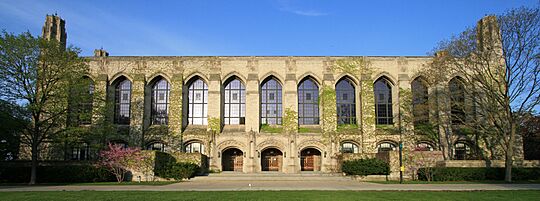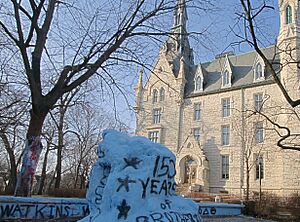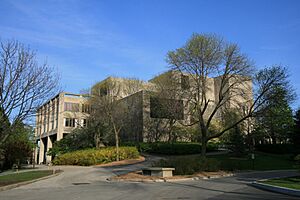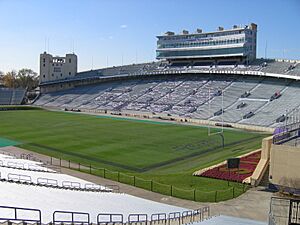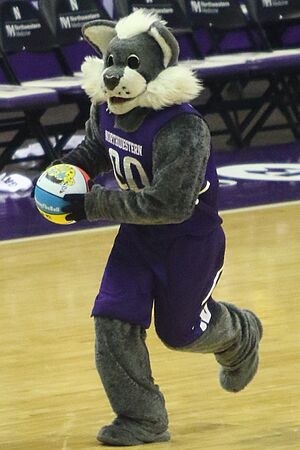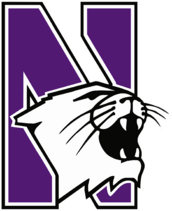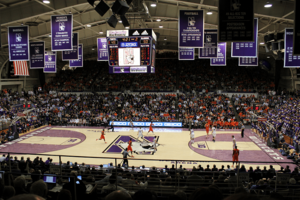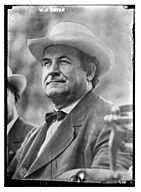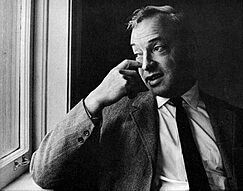Northwestern University facts for kids
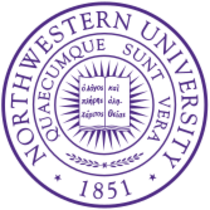 |
|
| Motto | Quaecumque sunt vera (Latin) On seal: Ὁ Λόγος πλήρης χάριτος καὶ ἀληθείας (Greek) |
|---|---|
|
Motto in English
|
"Whatsoever things are true" (Philippians 4:8 AV) "The Word full of grace and truth" (John 1:14) |
| Type | Private research university |
| Established | January 28, 1851 |
| Accreditation | HLC |
|
Academic affiliations
|
|
| Endowment | $15.6 billion (2025) |
| Budget | $3.3 billion (2024) (excluding the health system) |
| President | Michael Schill |
| Provost | Kathleen Hagerty |
|
Academic staff
|
4,018 (fall 2021) |
| Students | 22,801 (fall 2023) |
| Undergraduates | 8,846 (fall 2023) |
| Postgraduates | 13,955 (fall 2023) |
| Location |
,
,
42°03′21″N 87°40′29″W / 42.05583°N 87.67472°W |
| Campus | Small city, 240 acres (97 ha) |
| Other campuses | |
| Newspaper | The Daily Northwestern |
| Colors | Purple and white |
| Nickname | Wildcats |
|
Sporting affiliations
|
|
| Mascot | Willie the Wildcat |
Northwestern University (NU) is a private research university located in Evanston, Illinois, USA. It was founded in 1851 to serve the historic Northwest Territory. It is the oldest university in Illinois to receive a special charter.
Northwestern was first connected to the Methodist Episcopal Church. However, it later became a non-religious university. By 1900, it was the third-largest university in the United States. Northwestern became a founding member of the Big Ten Conference in 1896. It also joined the Association of American Universities in 1917.
Northwestern has eleven schools for undergraduate, graduate, and professional studies. These schools cover subjects like business, law, journalism, engineering, and medicine. As of 2024, the university has a large financial fund of $15.6 billion. Its yearly budget is about $3.3 billion, and it receives over $1 billion for research. The university has 19 sports teams, called the Northwestern Wildcats. They compete in NCAA Division I in the Big Ten Conference.
Many famous people have been part of Northwestern. As of September 2020, 33 Nobel Prize winners and 2 Fields Medalists were connected to Northwestern. This includes former students or teachers. Northwestern has also been linked to 47 Pulitzer Prize winners and many other award recipients. Its former students include 10 living billionaires, 2 U.S. Supreme Court Justices, and 25 Olympic medalists.
Contents
University History
How Northwestern University Started
Northwestern University began with a meeting on May 31, 1850. Nine important Chicago businessmen, Methodist leaders, and lawyers wanted to create a university. They aimed to serve the area known as the Northwest Territory. On January 28, 1851, the Illinois General Assembly officially approved the Trustees of the North-Western University. This made it the first university in Illinois to be officially chartered.
The nine founders were all Methodists. They prayed before their first meeting. Even though they were connected to the Methodist Episcopal Church, they wanted to welcome all students. They believed Northwestern should help everyone in the growing territory. They also wanted to improve the economy in Evanston.
John Evans, for whom Evanston is named, bought 379 acres of land in 1853. This land was along Lake Michigan. Philo Judson then planned the city of Evanston. The first building, Old College, opened on November 5, 1855. To get money for building, Northwestern sold "perpetual scholarships" for $100. These scholarships gave free tuition to the buyer and their family forever. Another building, University Hall, was built in 1869. It was made of the same stone as the Chicago Water Tower. This tower was one of the few buildings in Chicago to survive the Great Chicago Fire of 1871.
In 1873, the Evanston College for Ladies joined Northwestern. Frances Willard became the school's first dean of women. She later became famous for her work for women's right to vote. Willard Residential College, built in 1938, is named after her. Northwestern welcomed its first female students in 1869. The first woman graduated in 1874. Northwestern started its first intercollegiate football team in 1882. Later, it became a founding member of the Big Ten Conference. In the 1870s and 1880s, Northwestern partnered with existing law, medicine, and dentistry schools in Chicago. As more students joined, these professional schools became part of the main university in Evanston. This created a modern university with professional, graduate, and undergraduate programs. It valued both teaching and research.
Northwestern in the 1900s
By 1900, Northwestern had become the third-largest university in the United States. It was behind Harvard University and the University of Michigan. From 1920 to 1939, under President Walter Dill Scott, Northwestern began building a campus in Chicago. This campus was designed by James Gamble Rogers in the Collegiate Gothic style. It was meant to house the professional schools. James Gamble Rogers also designed a library on the Evanston campus. This library was built with a $1 million gift from the family of Charles Deering. It is named the Deering Library and looks like King's College Chapel at Cambridge University.
The university also started the Kellogg School of Management. Several important buildings were built on the Evanston campus, including Dyche Stadium, now called Ryan Field. In the 1920s, Northwestern was one of the first six U.S. universities to create a Naval Reserve Officers Training Corps (NROTC). In 1939, Northwestern hosted the first-ever NCAA Division I men's basketball championship game. This took place in the original Patten Gymnasium.
The Great Depression in the United States (1929–1941) made things tough for the university's money. Its yearly income dropped by 25 percent. Fewer people could pay full tuition. Donations from former students also went down. The university had to cut salaries for all employees by 10 percent twice. They also stopped hiring and building. They spent less on maintenance, books, and research. The university faced money problems for four years. Student numbers fell in most schools. However, Northwestern started a new graduate program in education. This helped bring in new students and money. In 1933, the president of the University of Chicago suggested combining the two universities. This idea was dropped because many Northwestern alumni did not want to lose their university's unique traditions. In 1935, the Deering family gave $6 million to the university. This helped the budget and allowed some spending cuts to be reversed.
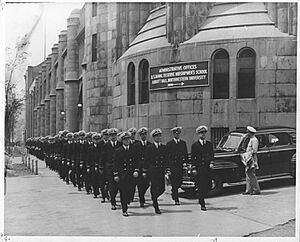
Like other American universities, Northwestern changed during World War II (1939–1945). Regular student numbers dropped a lot. But the school started quick, intense programs. These programs trained over 50,000 military people, including future president John F. Kennedy. Northwestern's NROTC program was very helpful. It trained over 36,000 sailors during the war. This led to Northwestern being called the "Annapolis of the Midwest." Franklyn B. Snyder led the university from 1939 to 1949. After the war, many soldiers came to college using the G.I. Bill. This led to a big growth of both campuses. In 1948, a famous anthropologist, Melville J. Herskovits, started the Program of African Studies at Northwestern. This was the first center of its kind in an American university.
J. Roscoe Miller was president from 1949 to 1970. During his time, the Evanston campus grew. The Lakefill was built on Lake Michigan. The number of teachers and new school programs also increased. In 1996, Princess Diana visited Northwestern's Evanston and Chicago campuses. She helped raise money for cancer research at the university hospital. Her visit raised $1.5 million.
Northwestern in the 2000s
In the 2010s, a five-year fundraising effort led to new buildings. These included a new music center, a new building for the business school, and a $270 million sports complex. In 2014, President Barack Obama gave an important speech about economics at the Evanston campus. In 2015, Queen Máxima and King Willem-Alexander of the Netherlands visited Northwestern. They announced research partnerships between Northwestern and Dutch groups. These partnerships focused on studying aging.
In 2021, the Ryan Family gave an additional $480 million to Northwestern. This was the largest donation in the university's history. The money was for research at the Kellogg School of Management and Feinberg School of Medicine. It also helped renovate Ryan Field. In 2023, Northwestern partnered with Oakton College and the Illinois Department of Corrections. They awarded the first bachelor's degrees in the U.S. to a group of prisoners from a top-ranked university.
In April 2024, Northwestern University students joined protests on other campuses. These protests were about the Gaza war. The students asked the university to stop investing in companies connected to Israel. They also wanted the administration to protect freedom of speech and be open about its investments. The university and the students reached an agreement. This agreement allowed peaceful protests. It also gave students a voice on an investment committee. The university also promised to bring Palestinian students to campus.
University Campuses
Northwestern has its main campus in Evanston, Illinois. It also has a campus in Chicago and another in Qatar.
Evanston Campus
Northwestern's main campus is on the shore of Lake Michigan. It is in the Chicago metropolitan area. The campus covers 240 acres. It has a mix of modern and old gothic-style buildings.
The Evanston campus is where the undergraduate schools, the Graduate School, and the Kellogg School of Management are located. It stretches from Lincoln Avenue to Clark Street, west of Lake Michigan, along Sheridan Road. The North Campus has fraternity houses and sports facilities. It also has the Technological Institute and Dearborn Observatory. The South Campus has the university's humanities buildings and music buildings. These include the Pick-Staiger Concert Hall and the Mary and Leigh Block Museum of Art.
In the 1960s, the university added 84 acres to the campus. They did this by filling in part of Lake Michigan. Buildings on this new land, called the Lakefill, include the University Library and the Kellogg School of Management Global Hub.
The Chicago Transit Authority's elevated train runs through Evanston. It is called the Purple Line, named after Northwestern's school color. Several train stations are close to the campus. Bus routes also serve the Evanston campus.
Chicago Campus
Northwestern's Chicago campus is in the city's Streeterville neighborhood. It is also near Lake Michigan. This campus is home to the highly-rated Northwestern Memorial Hospital. It also has the medical school, the law school, and the School of Professional Studies.
The professional schools were originally spread out in Chicago. In 1920, 8.5 acres of land were bought for a central Chicago campus. Architect James Gamble Rogers designed the main buildings in the collegiate gothic style. In 1923, Mrs. Montgomery Ward donated $8 million. This money helped build the Montgomery Ward Memorial Building. It housed the medical and dental schools. This building became the first university skyscraper in the United States. Rogers also designed Wieboldt Hall for the business school and Levy Mayer Hall for the law school. These new buildings were officially opened in June 1927. The Chicago campus continued to grow with more buildings added later.
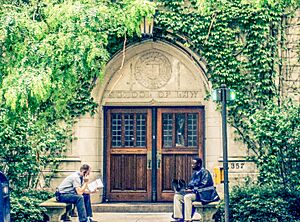
Education City Campus
In Fall 2008, Northwestern opened a campus in Education City, Doha, Qatar. This campus, called NU-Q, offers bachelor's degrees in journalism and communications. These programs are through the Medill School of Journalism and School of Communication. The Qatar Foundation for Education, Science and Community Development provides money for the campus. This includes funding for building and running costs. It also helps hire teachers and staff. Some teachers work at both the Evanston and Qatar campuses. Northwestern receives about $45 million each year to run the Qatar campus. In February 2016, Northwestern agreed to keep the NU-Q branch open for another ten years, until the 2027–2028 school year.
How Northwestern is Organized
University Leadership
Northwestern is a private university. It is run by a group called the Board of Trustees. This board has 70 members. As of 2022, Peter Barris is the chairman. The board chooses a president who is the main leader of the university. Northwestern has had seventeen presidents in its history. The current president is Michael Schill. He started in Fall 2022. The president has a team of vice presidents and other helpers. They manage things like money, teachers, and students. Kathleen Haggerty became the provost on September 1, 2020.
Students also help run the university. The Associated Student Government represents undergraduate students. The Graduate Student Association represents graduate students.
Each of Northwestern's 12 schools has its own faculty. These teachers decide on things like admission rules, what courses students need to take, and how degrees are given.
University Funding
Northwestern has a large fund of $14.3 billion. This is one of the biggest university funds among private universities in the United States. This fund grows through donations. Investment advisors at the university's Investment Office manage the money.
Academics at Northwestern
| Undergraduate and graduate schools | Graduate and professional |
|---|---|
Evanston Campus
|
Evanston Campus
Chicago Campus
|
How to Get Admitted
| Admissions statistics | |
|---|---|
|
2023 entering
classChange vs. 2018 |
|
| Admit rate | 7.2%
(
|
| Yield rate | 56.5%
(
|
| Test scores middle 50%* | |
| SAT Total | 1500–1560
(
|
| SAT EBRW | 730–770
(
|
| SAT Math | 760–790
(
|
| ACT Composite | 33–35
(
|
| High school GPA† | |
| Top 10% | 94.0%
(
|
| Top 25% | 98.0%
(
|
| Average | 4.1
(
|
|
|
Getting into Northwestern University is very competitive. U.S. News & World Report calls its admissions "most selective." For the 2022–2023 school year, Northwestern received a record 52,225 applications. They had about 2,100 spots for new students. For the Class of 2027, the acceptance rate was around 7.0%.
For the Class of 2026, students who got in usually scored between 1500 and 1560 on the SAT. On the ACT, scores were typically between 33 and 35. Also, 96% of admitted students were in the top ten percent of their high school classes.
About 35–40% of the students in the Class of 2027 were accepted through the Early Decision process. This means they applied early and committed to attend if accepted. Northwestern accepted about 1,000 students out of 5,220 early applications.
In April 2016, Northwestern joined 14 other Illinois universities in a partnership. This partnership helps students from Chicago Public Schools get into college. It provides scholarships to students who earn an associate degree from a city community college and then get into a bachelor's program at Northwestern.
Northwestern is "need-blind" for students from the U.S. This means they do not consider a student's ability to pay when deciding whether to admit them.
University Rankings
| ARWU World | 33 |
|---|---|
| THES World | 31 |
| USNWR National University | 6 (tie) |
| Washington Monthly National University | 34 |
| Forbes | 11 |
Northwestern is a large university focused on research. It is also a residential university, meaning many students live on campus.
What Students Learn
The university offers over 200 different subjects to study. This includes 124 undergraduate programs and 145 graduate and professional programs. There are also programs where students can earn two degrees. While there isn't one main set of required classes for everyone, all students must take courses in the liberal arts and sciences. Each school sets its own specific requirements for degrees.
Northwestern strongly encourages students to combine different subjects. About 72% of undergraduate students study two or more areas. Northwestern's full-time programs use an academic quarter system. The school year starts in late September and ends in early June. Each quarter lasts about 10 weeks. Undergraduates usually take four classes per quarter, or twelve classes a year. They need to complete at least twelve quarters on campus to graduate. Northwestern also has special programs for honors, faster degrees, and combined degrees in fields like medicine, science, engineering, and journalism.
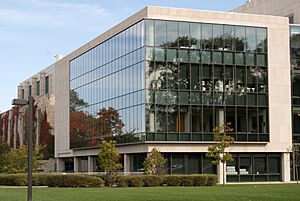
The most popular subjects at Northwestern in 2021 include communication, journalism, engineering, computer science, mathematics, statistics, biological sciences, physics, and chemistry. It is also well-known for law and medicine. Northwestern is officially approved by the Higher Learning Commission. It is also approved by national groups for many of its professional programs. In 2012–2013, Northwestern awarded many degrees: 2,190 bachelor's degrees, 3,272 master's degrees, 565 doctoral degrees, and 444 professional degrees. Since 1951, Northwestern has given out 520 special honorary degrees. Northwestern also has chapters of academic honor societies like Phi Beta Kappa.
Northwestern has a student-to-faculty ratio of 6:1. This means there are 6 students for every teacher. About 77% of classes have fewer than 20 students. Only 5.5% of classes have more than 50 students.
Libraries and Museums
Northwestern has a large library system. There are four libraries on the Evanston campus. These include the main University Library, the Boas Mathematics Library, Mudd Library, and the original Deering Library. There are also three libraries on the Chicago campus. In total, Northwestern Libraries have over 8 million printed or electronic books. They also have many maps, audio files, journals, movies, and historical papers. The University Library is the 14th-largest university library in North America based on the number of items it holds.
Special Collections
Some of the library's special collections include:
- Melville J. Herskovits Library of African Studies: Started in 1954, this is the largest collection of materials about Africa. It has over 400,000 books, including 20,000 in African languages.
- The Music Library: This library has a lot of printed music and historical materials. It focuses on music written since 1945. It includes the John Cage collection.
- Transportation Library: This is one of the biggest transportation information centers in the world. It has over 500,000 items about air, rail, highways, and water transport.
- The Art Library: This library has over 160,000 books and journals about art, architecture, and design. It is especially strong in art and architecture from the 1800s.
- Charles Deering McCormick Library of Special Collections: This collection has about 8,000 items related to the Siege and Commune of Paris from 1870–1871. It includes original photos, posters, and books from that time. It also has materials about military activities during the Spanish Civil War and early World War II.
- Northwestern University Archives Pritzker Legal Research Center: This library is on the Chicago campus and serves the Northwestern University Pritzker School of Law.
- Seeley G. Mudd Library: Located on North Campus, this library was updated in 2017 to be more collaborative and technology-friendly.
- Charles Deering Memorial Library: Built in 1933, this library houses the art library, special collections, the Music Library, and University Archives.
- Boas Mathematics Library: This library mainly serves the Mathematics and Statistics Departments. It has about 34,000 books for research in pure mathematics and statistics.
The Mary and Leigh Block Museum of Art is a major art museum in Chicago. It has over 4,000 works in its permanent collection. It also uses a third of its space for temporary art shows.
Northwestern is also part of the Google Book Search project. This project helps digitize library collections. Northwestern University Library also works with the Native American Education Services College (NAES) to preserve their library and archives.
Research and Discoveries
University Research
Northwestern was chosen to join the Association of American Universities in 1917. It is known as an R1 university, which means it has "very high" research activity. Northwestern's schools of management, engineering, and communication are among the best in the country for academic work. The university received $923.8 million for research in 2022. It also received $421 million from the National Institutes of Health (NIH).
Northwestern has over 90 research centers within its schools and 40 university-wide centers. It also supports nearly 1,500 research labs. Most of these labs are in medical and biological sciences. Northwestern also has more than 50 University Research Institutes & Centers (URICS). These institutes combine different subjects to do research in areas like quantum information, policy, and bioelectronics.
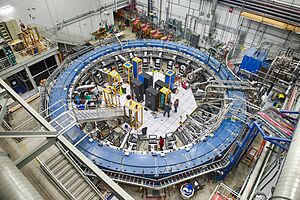
Northwestern is home to several important research centers. These include the Center for Interdisciplinary Exploration and Research in Astrophysics and the Nanoscale Science and Engineering Center. The university also works with other research places like Argonne National Laboratory and Fermi National Accelerator Laboratory (FermiLab). They work together on projects in particle physics, quantum physics, and superconducting technologies. Northwestern also partners with the University of Chicago and University of Illinois on research efforts like the CZ Biohub Chicago.
New Ideas and Businesses
In 2013, Northwestern researchers shared 247 new inventions. They applied for 270 patents and received 81 patents from other countries and the U.S. They also started 12 new companies and earned $79.8 million from licensing their inventions. The Innovation and New Ventures Office (INVO) helps create new centers like the Center for Developmental Therapeutics (CDT).
Northwestern files hundreds of patents every year. It is among the top 20 universities in the world for U.S. utility patents. One of the university's most successful patents is for pregabalin. This is a molecule developed by chemistry professor Richard Bruce Silverman. It was later sold as Lyrica, a medicine used to help with epilepsy and pain.
Northwestern has a long history of producing successful business people and entrepreneurs. Companies founded by Northwestern alumni include Groupon, The Blackstone Group, Booz Allen Hamilton, U.S. Steel, Kirkland & Ellis, Guggenheim Partners, Accenture, Aon Corporation, and AQR Capital.
The university also runs The Garage. This is a space for student-run startups. It provides students with resources and help for starting businesses. The Garage supports about 90 student-founded startups each school quarter. Its programs are open to all Northwestern students.
Student Life
Student Population
| Race and ethnicity | Total | ||
|---|---|---|---|
| White | 42% |
|
|
| Asian | 19% |
|
|
| Hispanic | 13% |
|
|
| Foreign national | 10% |
|
|
| Other | 9% |
|
|
| Black | 6% |
|
|
| Economic diversity | |||
| Low-income | 20% |
|
|
| Affluent | 80% |
|
|
Northwestern has over 8,000 undergraduate students and over 8,000 graduate students each year. For the 2023-2024 school year, 99% of freshmen returned for their second year. Eighty-six percent of students graduated in four years, and 96% graduated in six years.
Students come from all 50 U.S. states and over 75 other countries. Twenty percent of students in the Class of 2024 received Pell Grants, which help students from lower-income families. Also, 12.56% were the first in their families to go to college. Northwestern also has the ninth-highest number of National Merit Scholars in the nation.
In Fall 2014, the largest number of undergraduate students were in the Weinberg College of Arts and Sciences (40.6%). Other popular schools included Engineering (21.3%), Communication (14.3%), and Journalism (11.7%). The most common undergraduate degrees are economics, journalism, communication studies, psychology, and political science. The largest professional degree programs are in business (MBA), law (JD), and medicine (MD).
Student Housing
Northwestern offers both regular dorms and special residential colleges. Residential colleges are for students who share a particular interest. Examples include Chapin Hall (Humanities) and Slivka Residential College for Science and Engineering. Some residence halls are Allison Hall, Bobb-McCulloch, and Foster-Walker Complex.
About 20% of undergraduate students are part of a fraternity or sorority. Northwestern has 21 fraternities and 18 sororities.
All new undergraduate students at Northwestern University must live on campus for their first two years.
University Traditions
- Alma Mater: This is the Northwestern Hymn. The original Latin song was written in 1907. In 1953, an English version was written. Today, the Marching Band plays it at football games.
- Purple and White: Purple became Northwestern's official color in 1892. It replaced black and gold. White is also an official color. The university's oldest song, Alma Mater, mentions both colors.
- The Rock: This is a six-foot-high boulder given by the Class of 1902. Students started painting it in the 1940s as a prank. Now, it's a popular way for students to express themselves. By tradition, students must guard it for 24 hours before painting it. The rock is even streamed live on Youtube 24/7.
- Dillo Day: This is an all-day music festival held near the end of the spring quarter. It takes place on the Lakefill. Students organize this event, and it is the largest student-managed music festival in the United States.
- March Through the Arch: This tradition marks a student's start at the university. It happens during Wildcat Welcome week. Students walk through the Weber Arch, symbolizing their entry into college. Graduating students march back through the arch.
- Primal Scream: This happens every quarter on the Sunday before finals week. Students lean out of windows or gather in courtyards and scream. It helps them relieve stress.
Giving Back to the Community
One of Northwestern's student charity events is Dance Marathon. Since 2011, it has raised over $1 million for charity every year. It has given a total of $13 million to children's charities.
The Northwestern Community Development Corps (NCDC) is a student group. It connects hundreds of student volunteers to community projects in Evanston and Chicago. The group also holds yearly events. One is Project Pumpkin, a Halloween celebration. It gives over 800 local children carnival games and a safe place to trick-or-treat.
Many Northwestern students join the Freshman Urban Program. This program helps students interested in community service. They work on social issues in Chicago. The university's Global Engagement Studies Institute (GESI) also offers programs. These include group service-learning trips in Asia, Africa, or Latin America.
Several international nongovernmental organizations started at Northwestern. One is the World Health Imaging, Informatics and Telemedicine Alliance.
Performing Arts
Northwestern is known for its successful entertainers and strong performing arts programs. The Student Theatre Coalition (StuCo) organizes nine student theater companies. It also has many performance groups and over sixty independent shows each year. These shows include The Waa-Mu Show, an original musical written and produced by students.
Chicago's Lookingglass Theatre Company was founded in 1988 by several Northwestern alumni, including David Schwimmer. It has won many awards.
Undergraduate students have twelve a cappella groups. These include THUNK a cappella and the Northwestern Undertones. Northwestern's performing arts also include Boomshaka. This is the university's drum, dance, and rhythm group.
University Media
Print Publications
- The Daily Northwestern: Started in 1881, this is the university's main student newspaper. It is published on weekdays during the school year. Students run it completely.
- North by Northwestern: This is an online magazine for undergraduate students. It started in September 2006. It publishes news updates and special events. It also has a print magazine each quarter.
- Syllabus: This is the university's undergraduate yearbook. It comes out in late May. It shows all the year's events at Northwestern.
- Northwestern Flipside: This is a satirical magazine for undergraduates. It started in 2009. It publishes a weekly issue both in print and online.
- Helicon: This is the university's undergraduate literary magazine. It started in 1979. It publishes twice a year.
- The Protest: This is Northwestern's quarterly social justice magazine.
- Cultural Magazines: The Student Multicultural Affairs division supports several magazines for different cultural groups. These include Ahora (Hispanic/Latino culture), Al Bayan (Muslim culture), BlackBoard Magazine (African-American student life), and NUAsian (Asian/Asian-American culture).
- Northwestern University Law Review: This is a scholarly legal publication run by students at the Law School. It publishes six issues each year.
- Northwestern Journal of Technology and Intellectual Property: This is a law review published by students at the Law School.
- Northwestern Interdisciplinary Law Review: This is a scholarly legal publication published yearly by undergraduate students. It focuses on legal research that combines different fields like history, literature, and economics.
Online Publications
- TriQuarterly: This is a literary magazine published twice a year. It features poetry, fiction, essays, and art.
- Sherman Ave: Started in January 2011, this is a satirical website. It often publishes funny content about Northwestern student life.
- Politics & Policy: Founded in 2010 by undergraduates, this website provides analysis of current events and public policy.
- Northwestern Business Review: Founded in 2005, this is a campus source for business news.
- The Queer Reader: This is Northwestern's first radical feminist and LGBTQ+ publication.
Radio, Film, and Television
- WNUR (89.3 FM): This is a radio station that broadcasts to Chicago and nearby suburbs. It plays music (jazz, classical, rock), and has shows about literature, politics, news, and sports.
- Studio 22: This is a student-run company that produces about ten films each year. Many of its films have featured students who later became professional actors.
- Applause for a Cause: This is a student-run company that creates full-length films for charity. It started in 2010 and has raised over $25,000 for various organizations.
- Multicultural Filmmakers Collective: This group supports multicultural student filmmakers and stories. They have invited famous guest speakers like Ava DuVernay.
- Northwestern News Network: This is a student television news and sports network. It serves the Northwestern and Evanston communities. It is funded by the Medill School of Journalism.
Speech and Debate
The Northwestern Debate Society has won fifteen National Debate Tournaments. This is the highest number of any university. Famous alumni of the society include Erwin Chemerinsky, a legal scholar.
Northwestern's Mock Trial team had two teams qualify for the 2018 National Championship Tournament. This made Northwestern one of only seven schools with multiple teams at the competition. One team finished 9th in its division and was ranked 20th in the country for the 2018–2019 season.
University Athletics
Northwestern is a founding member of the Big Ten Conference. It was the only private university in the conference until 2024. It has the smallest number of undergraduate students compared to other Big Ten schools.
Northwestern has 19 intercollegiate sports teams (8 men's and 11 women's). It also has many club sports. Twelve of Northwestern's varsity programs have played in NCAA or bowl postseason games. Northwestern is one of only five private universities in the Association of American Universities that compete in NCAA Power Five conferences. It has a 98% NCAA Graduation Success Rate. This is the highest among Football Bowl Subdivision schools.
In 2018, the school opened the Walter Athletics Center. This is a $270 million modern facility for its sports teams, located by the lake.
Nickname and Mascot
Before 1924, Northwestern teams were called "The Purple." They were also unofficially known as "The Fighting Methodists." The name Wildcats was given to the university in 1924 by Wallace Abbey. He was a writer for the Chicago Daily Tribune. He wrote that the football players were like "wildcats." The name became so popular that the university officially made "Wildcats" its nickname a few months later.
The mascot of Northwestern Athletics is Willie the Wildcat. Before Willie, the team mascot was a live, caged bear cub named Furpaw. He was brought to games to greet fans. Willie the Wildcat first appeared in 1933 as a logo. Then, in 1947, students dressed as wildcats during a parade.
Football Team
The Northwestern Wildcats football team is a Division I college football team. They are part of the Big Ten Conference. The team's history goes back to 1882. They are known as the Wildcats.
The team has won three Big Ten championships or co-championships since 1995. They have also been able to play in bowl games five times between 2015 and 2020. Northwestern is proud of its academic success. Its football team consistently ranks high in graduation rates. They have won the AFCA Academic Achievement Award four times since 2002.
The Wildcats play their home games at Ryan Field. This stadium was formerly known as Dyche Stadium. They have played there since 1926. Because they are close to Chicago, Northwestern Football is often called "Chicago's Big Ten Team."
Northwestern's football team has been ranked in the top 10 of the AP poll 73 times since 1936. This includes five times at #1. They have won eight Big Ten conference championships since 1903. The team plays home games at Ryan Field in Evanston, Illinois. The Wildcats have played in 16 bowl games. They won three consecutive bowl games from 2016–2018. In 2020, the Wildcats won the Big Ten West Championship and their bowl game.
Basketball Teams
The Helms Athletic Foundation named the men's basketball team the 1931 National Champion. In 2017, the men's basketball team played in the NCAA tournament for the first time ever. They won their first game against Vanderbilt University.
Men's Basketball
The Wildcats men's basketball team is led by head coach Chris Collins. He has been the coach since 2013. Coach Collins led the Wildcats to their best season ever in 2016–17. They won a school-record 24 games and made it to the NCAA tournament for the first time. They also won their first tournament game. Collins was named one of the top four coaches for the Naismith Men's Coach of the Year award in 2017.
The Wildcats' only national championship is from 1931. Since then, the Wildcats have played in the National Invitation Tournament seven times. The men's basketball program was the first to play in the newly renovated Welsh-Ryan Arena on November 2, 2018. The arena was built to be very accessible and seats 7,039 people.
Women's Basketball
In 2017, Nia Coffey was chosen fifth overall in the WNBA draft. This was the highest draft pick in the program's history. The first player drafted from the program was Amy Jaeschke in 2011.
Fencing Team
The Northwestern Fencing program competes in the Central Collegiate Conference. It has a long history of success. Zach Moss is the head coach. He has been in this role since 2016. After a great 2017–18 season, Moss was named the Midwest Fencing Conference Coach of the Year. The Wildcats won their fifth conference championship and had three All-Americans at the NCAA Championships. The team also set a record for most wins in a season with 47. The 2018–19 season saw more achievements. The Wildcats had a 39–5 record and finished 11th at the NCAA Championships. They also won their second conference championship in a row. The Wildcats reached their highest ranking ever during that season, at second in the country.
Field Hockey Team
The Northwestern Field Hockey team plays its home games at Lakeside Field. This field is next to Lanny and Sharon Martin Stadium on the lakefront. The Wildcats are led by head coach Tracey Fuchs. She has been the coach since 2009. Coach Fuchs has led the Wildcats to two Big Ten titles and three NCAA tournament appearances. Under her leadership, the Wildcats have had winning seasons in 10 out of her 11 years.
The Northwestern Wildcats field hockey team has won six regular-season Big Ten titles and one tournament title. They have also appeared in the NCAA tournament 14 times. In 2021, the team won the NCAA tournament. They then played in the championship game again in 2022.
Lacrosse Team
Northwestern lacrosse has won the national championship in women's lacrosse five times in a row, from 2005 to 2009. They won again in 2011 and 2012. This gives them seven championships in eight years. In 2007, the team became only the second school to win three championships in a row. Their winning streak started in 2005. That year, the team had a perfect season. They beat many strong East Coast schools, even though their team had only been a varsity sport for five years. This was the school's first national championship since 1941. They became the westernmost school to win the title. The 2009 season was also undefeated. In their five straight championship seasons, the Wildcats had a record of 106 wins and only 3 losses. The Wildcats are led by head coach Kelly Amonte-Hiller. She has been the coach since 2002. The Wildcats won their first-ever Big Ten Championship in 2019. They also won their first-ever Big Ten regular season championship in 2021.
Wrestling Team
The Northwestern Wildcats wrestling program holds home matches in Welsh-Ryan Arena. They practice in the Ken Kraft Wrestling Room. The Wildcats are led by Matt Storniolo. He has been the coach since 2016. The Wildcats have had 40 Big Ten individual champions. They also have 10 NCAA individual champions and over 75 All-Americans.
Golf Team
The men's golf team has won eight Big Ten Conference championships. These were in 1925, 1937, 1939, 1948, 1999, 2000, 2001, and 2006. They finished second in the NCAA Championships twice, in 1939 and 1945. Luke Donald won the NCAA Individual Championship in 1999. He was named Big Ten Conference Player of the Year in 1999. David Merkow received the same honor in 2006. Donald was ranked number 1 in the Official World Golf Ranking for 56 weeks in 2011 and 2012.
People at Northwestern
Famous Alumni
Many famous people have graduated from Northwestern. In politics, these include U.S. Senator and presidential candidate George McGovern and Chicago Mayor Rahm Emanuel. Law school graduates include orator William Jennings Bryan and U.S. Supreme Court Justice John Paul Stevens.
A large number of Northwestern alumni are involved in theater, film, and television. They are sometimes called the "Northwestern mafia." Famous actors who attended include Warren Beatty, Julia Louis-Dreyfus, Charlton Heston, and British royal family member Meghan, Duchess of Sussex. Other media alumni include Stephen Colbert and Seth Meyers.
Other notable alumni include Nobel Prize-winning economist George J. Stigler and Nobel Prize-winning novelist Saul Bellow. Also, Pulitzer Prize-winning composer Ned Rorem and A Song of Ice and Fire author George R. R. Martin. Northwestern ranks eighth among U.S. universities in the number of billionaires it has produced. Northwestern alumni have founded major companies like the Mayo Clinic, The Blackstone Group, U.S. Steel, Accenture, Aon Corporation, and Booz Allen Hamilton.
University Faculty
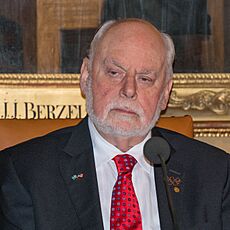
The university has 3,781 faculty members across its eleven schools. This includes 18 members of the National Academy of Sciences. It also has 65 members of the American Academy of Arts and Sciences and 19 members of the National Academy of Engineering.
Faculty members include Nobel Prize-winning economist Dale T. Mortensen. Also, nano-scientists Chad Mirkin and Samuel I. Stupp. Other notable faculty include Tony Award-winning director Mary Zimmerman and management expert Philip Kotler. Sir Fraser Stoddart, a Nobel laureate, is also a faculty member. The faculty also includes Richard Bruce Silverman, who invented Lyrica.
See also
 In Spanish: Universidad del Noroeste para niños
In Spanish: Universidad del Noroeste para niños
 | Janet Taylor Pickett |
 | Synthia Saint James |
 | Howardena Pindell |
 | Faith Ringgold |


